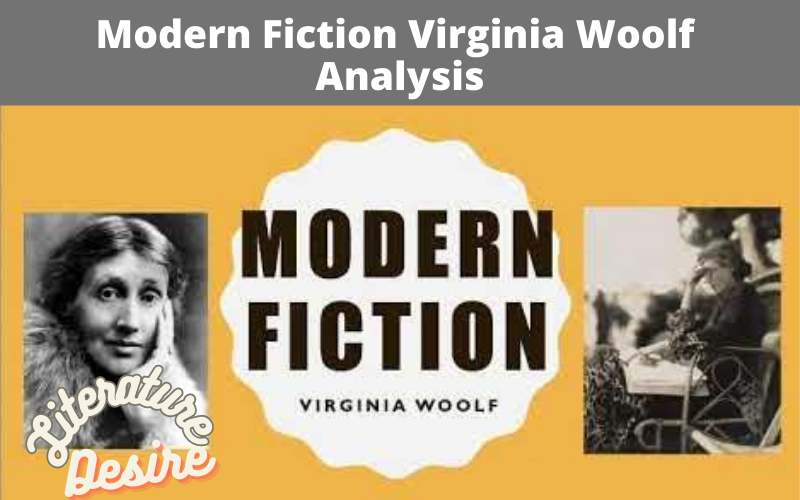In this article, we will delve into the analysis of “Modern Fiction” by Virginia Woolf and its significance in the realm of literature.
Virginia Woolf, a prominent figure in modernist literature, revolutionized the literary world with her groundbreaking works. One of her notable contributions is the novel “Modern Fiction,” which showcases her unique writing style and thematic explorations.
Modern Fiction Virginia Woolf Analysis
The Life and Works of Virginia Woolf
Before delving into the analysis of “Modern Fiction,” it is essential to gain an understanding of Virginia Woolf’s life and her notable works. Virginia Woolf, born in 1882 in London, England, was a British writer and a key figure in the Bloomsbury Group. She produced a wide range of influential works, including novels, essays, and non-fiction.
Some of Woolf’s renowned works, aside from “Modern Fiction,” include “Mrs. Dalloway,” “To the Lighthouse,” and “A Room of One’s Own.” Through her writing, Woolf explored themes of gender, consciousness, and the human experience, challenging traditional literary conventions and advocating for a more inclusive and introspective approach to storytelling.
The Writing Style of Virginia Woolf
Virginia Woolf’s writing style in “Modern Fiction” exemplifies her experimental and innovative approach to literature. She employed several techniques that distinguished her work from conventional narratives.
Stream of Consciousness Technique
One of the defining features of Woolf’s writing is her use of the stream-of-consciousness technique. This literary device allows readers to delve into the inner thoughts and emotions of the characters, providing a more intimate and introspective reading experience.
Woolf’s stream-of-consciousness style captures the ebb and flow of human consciousness, portraying the characters’ fragmented and often nonlinear thinking patterns.
Experimental Narrative Structure: Modern Fiction Virginia Woolf Analysis
Woolf’s exploration of narrative structure in “Modern Fiction” challenges traditional linear storytelling.
She breaks away from chronological order and experiments with unconventional narrative techniques, such as flashbacks and shifts in perspectives.
These structural innovations create a sense of fluidity and reflect the complexities of the human experience.
Introspective and Psychological Themes
Woolf delves deeply into the interior lives of her characters, exploring their emotions, desires, and struggles.
She delves into the depths of the human psyche, unraveling the complexities of human thought and perception.
Themes of identity, consciousness, and the search for meaning are recurrent in her works, including “Modern Fiction.”
Analysis of Modern Fiction by Virginia Woolf
“Modern Fiction” by Virginia Woolf is a thought-provoking piece that offers a rich canvas for analysis. Here, we will explore some key aspects of the novel and the underlying messages conveyed by the author.
Exploration of Interior Lives
Woolf’s “Modern Fiction” delves into the interior lives of characters, peeling back the layers of their thoughts and emotions. By focusing on the characters’ inner worlds, Woolf emphasizes the subjective nature of reality and challenges the notion of objective truth.
She highlights the complexities of human existence, portraying the intricate interplay between individual experiences and external circumstances.
Fragmentation of Time and Space
In “Modern Fiction,” Woolf breaks away from linear narratives and experiments with the fragmentation of time and space.
The novel’s structure reflects the disjointed nature of human perception, where thoughts, memories, and experiences often overlap and intertwine.
By embracing this fragmented approach, Woolf captures the fluidity of consciousness and presents a more authentic representation of the human experience.
Feminist Perspectives: Modern Fiction Virginia Woolf Analysis
Virginia Woolf was a prominent feminist and her works often reflect her feminist ideologies. “Modern Fiction” subtly challenges traditional gender roles and societal expectations placed upon women.
Through her female characters, Woolf explores themes of identity, autonomy, and the struggle for self-expression in a patriarchal world.
Her writing serves as a critique of the limitations imposed on women and advocates for their liberation and empowerment.
Critique of Traditional Literary Conventions
In “Modern Fiction,” Woolf challenges the conventional norms of storytelling prevalent during her time. She questions the rigid structures, linear plots, and neatly resolved narratives that dominated the literary landscape.
By deviating from these conventions, Woolf invites readers to engage with her work in a more active and participatory manner, encouraging them to question established literary norms and explore new possibilities.
Influence and Legacy of Virginia Woolf’s Modern Fiction
Virginia Woolf’s “Modern Fiction” continues to resonate with readers and writers alike, leaving an indelible mark on the literary landscape. Her experimental style and thought-provoking themes have influenced numerous authors and shaped the evolution of modernist literature.
Woolf’s pioneering use of the stream-of-consciousness technique has inspired generations of writers to explore the depths of human consciousness and embrace innovative narrative forms.
Her feminist perspectives have also paved the way for feminist literary criticism and contributed to the ongoing discourse on gender and representation in literature.
Conclusion
Virginia Woolf’s “Modern Fiction” stands as a testament to her brilliance as a writer and her commitment to pushing the boundaries of literary expression.
Through her innovative writing style and thematic explorations, Woolf challenges conventional norms, offers introspective insights, and invites readers to contemplate the complexities of the human experience.
Her work continues to inspire and captivate audiences, making her an enduring figure in the world of modern fiction.
Frequently Asked Questions
“Modern Fiction” is significant for its experimental narrative techniques, such as stream of consciousness, and its exploration of interior lives and feminist perspectives. It challenges traditional literary conventions and offers a more introspective and nuanced reading experience.
Virginia Woolf revolutionized literature through her innovative writing style, including the stream-of-consciousness technique and experimentation with narrative structure. She explored themes of identity, consciousness, and feminism, challenging societal norms and expanding the possibilities of literary expression.
The Bloomsbury Group was a collective of intellectuals, writers, and artists active in the early 20th century in London. Virginia Woolf was a prominent member of this group, which advocated for artistic and intellectual freedom and played a significant role in the development of modernist literature.
In “Modern Fiction,” Virginia Woolf subtly challenges traditional gender roles and societal expectations placed upon women. She portrays women as complex individuals with their own desires, struggles, and agency, highlighting the limitations imposed upon them by a patriarchal society.



